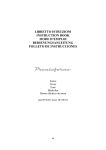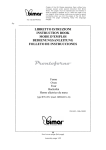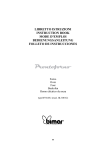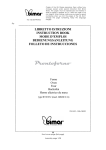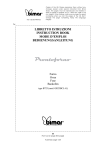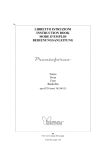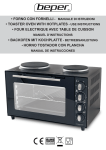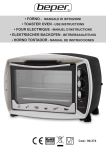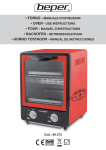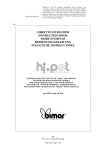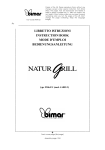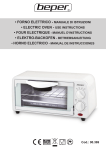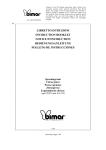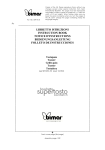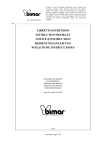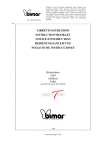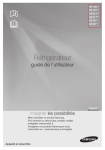Download LIBRETTO ISTRUZIONI INSTRUCTION BOOK MODE D'EMPLOI
Transcript
Fax +32 030 9904733 Copies of the I/B. Please reproduce them without any changes except under special instruction from Bimar (Italy). The pages must be reproduced and folded in order to obtain a booklet A5 (+/- 148.5 mm width x 210 mm height). When folding, make sure you keep the good numbering when you turn the pages of the I/B. Don’t change the page numbering. Keep the language integrity LIBRETTO ISTRUZIONI INSTRUCTION BOOK MODE D’EMPLOI BEDIENUNGSANLEITUNG FOLLETO DE INSTRUCCIONES Forno Oven Four Backofen Horno eléctrico de mesa type B320.EU (mod. JK-2001C) Front cover page (first page) Assembly page 1/36 I signal that the height of the characters (4mm) is only for "AVVERTENZE GENERALI" and for the letters high-lighted, as rule EN 60335-1:2012. Fax +32 030 9904733 Copies of the I/B. Please reproduce them without any changes except under special instruction from Bimar (Italy). The pages must be reproduced and folded in order to obtain a booklet A5 (+/- 148.5 mm width x 210 mm height). When folding, make sure you keep the good numbering when you turn the pages of the I/B. Don’t change the page numbering. Keep the language integrity. Q uesto simbolo vi invita a leggere attentamente queste istruzioni prima dell’uso dell’apparecchio, ed eventualmente informare terzi, se necessario. C onservare il libretto per ulteriori consultazioni e per l’intera durata di vita dell’apparecchio. Se nella lettura di queste istruzioni d’uso alcune parti risultassero difficili nella comprensione o se sorgessero dubbi, prima di utilizzare il prodotto contattare l’azienda all’indirizzo scritto in ultima pagina. ATTENZIONE! Istruzioni e avvertenze per un impiego sicuro. Attenzione: per evitare il surriscaldamento non coprire l’apparecchio. Questo simbolo indica: ATTENZIONE: pareti calde . Le temperature della porta e delle superfici accessibili possono essere elevate quando l'apparecchio è in funzione. AVVERTENZE • Questo apparecchio è destinato solo all’uso domestico (quindi non professionale), per cuocere, scaldare, tostare, scongelare, gli alimenti, secondo le modalità indicate in queste istruzioni. Fare attenzione alla cottura di cibi con oli e grassi poiché, se surriscaldati, sono possibili cause d’incendio. Ogni altro uso è da considerarsi improprio e pericoloso. Il costruttore non potrà essere ritenuto responsabile di eventuali danni derivanti da uso improprio, erroneo e irresponsabile e/o da riparazioni effettuate da personale non qualificato. Esempi di apparecchi per ambiente domestico sono apparecchi per tipiche funzioni domestiche, usati in ambito domestico, che possono essere utilizzati per tipiche funzioni domestiche anche da persone non esperte: - in negozi, uffici e altri luoghi di lavoro similari; - in aziende agricole o similari; - da clienti di alberghi, motel e altri ambienti di tipo residenziale; - in ambienti del tipo bed and breakfast. • Q uesto forno deve essere utilizzato all’interno di ambienti, su un piano d’appoggio sicuro (vedi par. installazione): quindi il forno non è concepito per essere utilizzato all’esterno, né per l’uso ad incasso, né per impieghi diversi da quelli indicati nel paragrafo precedente. 2/36 Assembly page 2/36 Fax +32 030 9904733 Copies of the I/B. Please reproduce them without any changes except under special instruction from Bimar (Italy). The pages must be reproduced and folded in order to obtain a booklet A5 (+/- 148.5 mm width x 210 mm height). When folding, make sure you keep the good numbering when you turn the pages of the I/B. Don’t change the page numbering. Keep the language integrity. • P • reparare gli alimenti da cuocere e posizionarli sulla teglia o griglia inox ripiano (adatta al contatto con gli alimenti). È possibile utilizzare anche contenitori resistenti al calore: non utilizzare contenitori che possano deformarsi, incendiarsi, o alterare gli alimenti. Assicurarsi sempre che il vassoio raccogli-briciole sia posizionato correttamente nella propria sede e non lasciare l’apparecchio incustodito mentre è in funzione. • uando è in funzione l’apparecchio si scalda (le superfici sono soggette a diventare calde durante l’uso), quindi toccare soltanto maniglia sportello, e le manopole in plastica; per estrarre piatti o altri contenitori, utilizzare guanti da cucina. • Quando il forno è in funzione, manipolare con attenzione lo sportello: Q - non versare liquidi sullo sportello per non rompere il vetro. - non appoggiare nulla sullo sportello (tegami o altri contenitori), per evitare il ribaltamento del forno - evitare di sbattere o urtare violentemente lo sportello durante l’utilizzo • • Non utilizzare l’apparecchio come fonte di calore. Non appoggiare nulla al di sopra del forno, non ostruire le griglie di aerazione: l’ostruzione delle griglie può causare un surriscaldamento dell’apparecchio. N • on riscaldare, o usare materiali infiammabili all’interno o vicino al forno: i vapori potrebbero causare pericoli d’incendio o esplosioni. • on mettere mai della carta, del cartone o della plastica all’interno dell’apparecchio e non posare mai niente al di sopra dello stesso (utensili, griglie, altri oggetti). • lcuni alimenti possono bruciare: verificare sempre il forno durante la loro cottura. In caso di fiamme emanate dai cibi o altre parti, non tentare in nessun caso di spegnerle con acqua, ma invece mantenere lo sportello chiuso, togliere immediatamente la spina dalla presa di corrente e soffocare le fiamme con un panno umido. • Non spostare il forno quando è in funzione. Se l’apparecchio non è in funzione togliere la spina dalla presa di corrente. Scollegare sempre l’apparecchio dalla presa di corrente prima di assemblare, smontare e prima di • • N A pulire l’apparecchio. L • ’apparecchio potrà essere usato da bambini di età superiore agli 8 anni e da persone con ridotte capacità fisiche, sensoriali o mentali, o con mancanza di esperienza e conoscenza, purchè ricevano la necessaria sorveglianza o istruzioni riguardanti l’uso in sicurezza dell’apparecchio e che siano consci dei potenziali pericoli o se sorvegliati da una persona responsabile della loro sicurezza. I bambini non devono giocare con l’apparecchio. La pulizia e la manutenzione dell’apparecchio non possono essere effettuate da bambini a meno che non abbiano un’ètà superiore agli 8 anni e in ogni caso sotto la supervisione di un adulto. Tenere l’apparecchio e il suo cavo di alimentazione lontani dai bambini di età inferiore agli 8 anni. • Adottate le dovute precauzioni per evitare che i bambini giochino con l’apparecchio. 3/36 Assembly page 3/36 Fax +32 030 9904733 Copies of the I/B. Please reproduce them without any changes except under special instruction from Bimar (Italy). The pages must be reproduced and folded in order to obtain a booklet A5 (+/- 148.5 mm width x 210 mm height). When folding, make sure you keep the good numbering when you turn the pages of the I/B. Don’t change the page numbering. Keep the language integrity. • • Attenzione: quando si utilizzano apparecchi elettrici, occorre sempre rispettare le precauzioni di sicurezza di base per evitare i rischi di incendio, di scosse elettriche e di lesioni fisiche. • Quando il forno viene utilizzato in presenza di bambini occorre un’attenzione particolare dato che le pareti metalliche e la porta del forno diventano molto calde. • L'utilizzatore non deve lasciare l’apparecchio senza sorveglianza quando è in funzione e collegato all'alimentazione. • • • • Non toccare l’apparecchio con mani o piedi bagnati. Non lasciare l’apparecchio esposto agli agenti atmosferici (sole, pioggia, ecc.). Non tirare il cavo per spostare l’apparecchio. Non tirare il cavo di alimentazione o l’apparecchio stesso per disinserire la spina dalla presa di corrente. • Al fine di evitare ogni rischio di scossa elettrica, non immergere mai la spina, il cordone elettrico e l’apparecchio nell’acqua od in nessun altro liquido. Q • uesto apparecchio non è destinato a essere fatto funzionare per mezzo di un temporizzatore esterno o con un sistema di comando a distanza separato, per evitare il rischio di incendio nel caso l’apparecchio sia coperto o sia posizionato in modo non corretto. • Se il cavo di alimentazione è danneggiato, esso deve sostituito dal costruttore o dal suo servizio assistenza tecnica o comunque da una persona con qualifica similare, in modo da prevenire ogni rischio. • V erificare periodicamente il buono stato dell’apparecchio e dei suoi elementi: in caso di dubbio rivolgersi ad un centro assistenza autorizzato e accertarsi che i ricambi forniti siano originali. INSTALLAZIONE Dopo aver tolto l’imballaggio, assicurarsi dell’integrità dell’apparecchio (soprattutto l’integrità dei vetri dello sportello); in caso di dubbio non utilizzarlo e rivolgersi a personale professionalmente qualificato. Gli elementi di imballaggio (sacchetti in plastica, polistirolo espanso, chiodi, ecc.) non devono essere lasciati alla portata di mano di bambini in quanto potenziali fonti di pericolo; smaltirli secondo le norme vigenti negli appositi contenitori per la raccolta differenziata. Attenzione: eventuali adesivi o fogli pubblicitari applicati sullo sportello, o film protettivi, devono essere rimossi prima dell’uso dell’apparecchio. • Prima di collegare l’apparecchio controllare che i valori di tensione riportati sulla targa dati corrispondano a quelli della rete elettrica e che la presa sia dotata di efficace messa a terra (la casa costruttrice declina ogni responsabilità derivante dalla mancata osservazione di questa norma). In caso di incompatibilità tra la presa e la spina dell’apparecchio, far sostituire la presa con altra di tipo adatto da personale professionalmente qualificato, il quale accerti che la sezione dei cavi della presa sia idonea alla potenza assorbita dall’apparecchio . Verificare che sulla linea elettrica non siano collegati altri apparecchi ad elevato assorbimento, per evitare sovraccarichi e rischi di incendio. In generale è sconsigliato l’uso di adattatori e/o prolunghe; se il loro uso si rendesse indispensabile, • 4/36 Assembly page 4/36 Fax +32 030 9904733 • • • • • • • - - - • Copies of the I/B. Please reproduce them without any changes except under special instruction from Bimar (Italy). The pages must be reproduced and folded in order to obtain a booklet A5 (+/- 148.5 mm width x 210 mm height). When folding, make sure you keep the good numbering when you turn the pages of the I/B. Don’t change the page numbering. Keep the language integrity. devono essere conformi alle vigenti norme di sicurezza e la loro portata di corrente (ampères) non deve essere inferiore a quella massima dell’apparecchio. L’apparecchio non deve essere posizionato immediatamente al di sotto di una presa di corrente. La presa di corrente deve essere facilmente accessibile in modo da poter disinserire con facilità la spina in caso di emergenza. Si raccomanda di tenere l’apparecchio lontano dal bordo del piano di lavoro e fuori dalla portata dei bambini. Prima di ogni utilizzo verificare che l’apparecchio sia in buono stato, che il cordone elettrico non sia danneggiato: in caso di dubbio rivolgersi a personale professionalmente qualificato. Al primo utilizzo è necessario pulirlo e lavare le parti a contatto gli alimenti: vedi paragrafo “Pulizia e Manutenzione”. Assicurarsi che il cordone elettrico sia posizionato correttamente e non sia a contatto con parti calde o spigoli taglienti, né avvolto intorno all’apparecchio e non passi sotto il forno, non sia attorcigliato su se stesso e non si impigli, onde evitare una caduta dell’apparecchio. Posizionare l’apparecchio: lontano da altre fonti di calore (ad es. altri forni, fornello gas, ecc. ), da materiali infiammabili (tappezzerie, ecc.), materiale esplosivo (bombolette spray) e da materiali che possono deformarsi con il calore su un piano d’appoggio orizzontale e ben stabile, la cui superficie sia resistente al calore, ignifuga, e non sia delicata (ad esempio mobili laccati, tovaglie, ecc), in posizione dove non possa subire urti, e a debita distanza dal bordo del mobile, in modo che non possa cadere. lontano da contenitori di liquidi, ad esempio lavelli ecc. Nel caso dovesse inavvertitamente bagnarsi o immergersi in un liquido, staccare immediatamente la spina dalla presa di corrente, farlo raffreddare, asciugarlo con cura, e verificare che le parti elettriche non si siano bagnate; in caso di dubbio rivolgersi a personale professionalmente qualificato. deve avere uno spazio libero di almeno 35 cm di spazio libero nella parte superiore, 10 cm nella parte posteriore e 20 cm ai lati. In caso di guasto o cattivo funzionamento spegnere l’apparecchio e farlo controllare da personale professionalmente qualificato; le riparazioni effettuate da personale non qualificato possono essere pericolose e fanno decadere la garanzia. ISTRUZIONI DI IMPIEGO Attenzione: non lasciare l’apparecchio incustodito mentre è in funzione. Il forno è dotato dei seguenti elementi di regolazione: -Termostato (part.4). Regola la temperatura interna del forno; ruotare la manopola in corrispondenza al valore di temperatura desiderato: le resistenze si accendono e al raggiungere della temperatura impostata, si spengono; si riattivano non appena questa diminuisce. - Selettore (part.3). seleziona le modalità di cottura del forno e azionando le resistenze superiore e/o inferiore o entrambe. Nel dettaglio: = resistenza superiore + inferiore + ventilazione interna: l’aria calda circola nella cavità del forno per dorare e cuocere in modo uniforme = resistenza superiore (cuoce prevalentemente nella parte superiore )+ ventilazione interna: l’aria calda circola nella cavità del forno = resistenza inferiore (cuoce prevalentemente nella parte inferiore )+ ventilazione interna: l’aria calda circola nella cavità del forno = resistenza superiore + inferiore : cuoce uniformemente = resistenza inferiore: cuoce prevalentemente nella parte inferiore 5/36 Assembly page 5/36 Fax +32 030 9904733 Copies of the I/B. Please reproduce them without any changes except under special instruction from Bimar (Italy). The pages must be reproduced and folded in order to obtain a booklet A5 (+/- 148.5 mm width x 210 mm height). When folding, make sure you keep the good numbering when you turn the pages of the I/B. Don’t change the page numbering. Keep the language integrity. = resistenza superiore: cuoce prevalentemente nella parte superiore I tempi della cottura statica e ventilata sono diversi: ai primi utilizzi verificare costantemente il cibo in modo da individuare tempo e temperatura più idonei per ogni cottura. -Timer (part.2). Regola il tempo di funzionamento del forno, della convezione interna e del segnalatore luminoso; ruotare la manopola in corrispondenza al valore del tempo desiderato, al termine del quale le resistenze, la ventola e il segnalatore luminoso si spengono, la manopola torna gradualmente nella posizione “O” e contemporaneamente emette un segnale acustico ( “drin” ). - Convenzione interna: l’aria calda circola nella cavità del forno per dorare e cuocere in modo uniforme, è attiva quando il timer è in funzione. Il forno è dotato inoltre dei seguenti accessori: maniglia di presa (part.1) griglia ripiano (part. 7) da inserire in una delle apposite guide, estrarre la griglia utilizzando solo l’apposita maniglia teglia ripiano (part. 8) da inserire in una delle apposite guide, estrarre la teglia utilizzando solo l’apposita maniglia il vassoio raccogli-briciole (part.9) sia posizionato sotto le resistenze inferiori, altrimenti se posizionato erroneamente o se mancante, la superficie del piano d’appoggio si surriscalda; permette di raccogliere briciole o liquidi che tracimano lampada spia: si accende quando il timer è in funzione Primo utilizzo 1. Prima di ogni utilizzo verificare che l’apparecchio sia in buono stato, che il cordone elettrico non sia danneggiato: se il cavo di alimentazione è danneggiato, esso deve sostituito dal costruttore o dal suo servizio assistenza tecnica o comunque da una persona con qualifica similare, in modo da prevenire ogni rischio. 2. Attenzione: prima di pulire l’apparecchio, disinserire sempre la spina dalla presa di corrente. 3. Al primo impiego lavare con acqua saponata e sciacquare tutti gli accessori (teglia, griglia, vassoio raccoglibriciole e maniglia di presa); prima del loro utilizzo asciugarli accuratamente. Non utilizzare pagliette metalliche o prodotti abrasivi. Non lavarli in lavastoviglie. Pulire l’interno con un panno umido ed asciugare bene. 4. Al primo utilizzo, far funzionare “a vuoto” l’apparecchio, per eliminare “l’odore di nuovo” ed eventuali oli residui di lavorazione. Inserire la spina nella presa di corrente, regolare il termostato nella pos. “max”, ruotare la manopola del timer nella pos. “20”, ruotare la manopola del selettore nella pos. . Terminato il ciclo, disinserire la spina dalla presa di corrente ed attendere che si sia raffreddato, prima di rimuovere gli accessori. Cottura al forno In generale non necessita pre-riscaldo, tuttavia per alcuni cibi (carni al sangue, dolci) è bene eseguire questa operazione, procedendo come descritto e tenendo chiusa la porta del forno. • Posizionare la griglia ripiano o la teglia ripiano alla giusta altezza, inserendole nelle apposite guide. • Posizionare il vassoio raccoglibriciole nella propria sede (sotto le resistenze inferiori) • Inserire l’alimento (nella teglia o nei contenitori resistenti al calore, ecc.) e chiudere lo sportello. • Eseguire le seguenti operazioni: inserire la spina nella presa di corrente ruotare la manopola del termostato in senso orario alla temperatura di impiego più idonea ruotare la manopola del selettore nella posizione desiderata 6/36 Assembly page 6/36 Fax +32 030 9904733 Copies of the I/B. Please reproduce them without any changes except under special instruction from Bimar (Italy). The pages must be reproduced and folded in order to obtain a booklet A5 (+/- 148.5 mm width x 210 mm height). When folding, make sure you keep the good numbering when you turn the pages of the I/B. Don’t change the page numbering. Keep the language integrity. - girare la manopola del timer in corrispondenza al valore del tempo desiderato: nel caso il tempo di cottura fosse insufficiente, riarmare il timer per il tempo ancora necessario. • Terminata la cottura, ruotare la manopola (in senso antiorario) del termostato nella pos. Min (100) e togliere la spina dalla presa di corrente. Attenzione: quando il forno non è in funzione, togliere la spina dalla presa di corrente o prima di eseguire la pulizia. PULIZIA E MANUTENZIONE Attenzione: prima di pulire l’apparecchio, spegnerlo, disinserire la spina dalla presa di corrente. L’apparecchio e tutti i suoi elementi a contatto con gli alimenti (griglia e teglia, ecc) necessitano di pulizia accurata e al termine di ogni utilizzo. • Per la pulizia della griglia e teglia di cottura, vassoio raccoglibriciole utilizzare una spugnetta morbida con acqua tiepida e un normale detersivo per stoviglie, risciacquare poi con acqua abbondante, e asciugare con cura. Non utilizzare pagliette metalliche o prodotti abrasivi. La griglia di cottura ed il vassoio raccoglibriciole possono essere lavati in lavastoviglie. • La superficie esterna può essere pulita unicamente con un panno morbido leggeremente inbevuto d’acqua e/o normale detersivo. Fare attenzione affinchè non penetri acqua o detersivo liquido all’interno delle fessure poste sul revistimento. Non può essere lavato in lavastoviglie e neppure sotto il getto d’acqua: nel caso le parti elettriche (inclusi cordone e spina) si bagnino, asciugare con cura e completamente prima dell’utilizzo. • Per la pulizia all'interno del forno non utilizzare mai prodotti corrosivi e non grattare le pareti con oggetti appuntiti o taglienti. Non utilizzare pagliette metalliche o prodotti abrasivi. Pulire con una spugna umida di acqua e di un normale detersivo liquido per stoviglie. Prima di impiegarlo verificare che sia perfettamente asciutto, soprattutto i contatti. • Se si decide di non utilizzare più l’apparecchio, si raccomanda di renderlo inoperante tagliando il cavo di alimentazione (prima assicurarsi d’aver tolto la spina dalla presa di corrente), e di rendere innocue quelle parti che sono pericolose qualora utilizzate per gioco dai bambini. Avvertenze per il corretto smaltimento del prodotto ai sensi della Direttiva Europea direttiva 2011/65/UE. Alla fine della sua vita utile il prodotto non deve esser smaltito insieme ai rifiuti urbani. Può essere consegnato presso gli appositi centri di raccolta differenziata predisposti dalle amministrazioni comunali, oppure presso i rivenditori che forniscono questo servizio. Smaltire separatamente un elettrodomestico consente di evitare possibili conseguenze negative per l’ambiente e per la salute derivanti da un suo smaltimento inadeguato e permette di recuperare i materiali di cui è composto al fine di ottenere un importante risparmio di energia e di risorse. Per rimarcare l’obbligo di smaltire separatamente gli elettrodomestici, sul prodotto è riportato il marchio del contenitore di spazzatura mobile barrato. Lo smaltimento abusivo del prodotto da parte dell’utente comporta l’applicazione delle sanzioni amministrative previste dalla normativa vigente. 7/36 Assembly page 7/36 I signal that the height of the characters (4mm) is only for "GENERAL NOTICES" for the letters high-lighted, as rule EN 60335-1:2012. Fax +32 030 9904733 Copies of the I/B. Please reproduce them without any changes except under special instruction from Bimar (Italy). The pages must be reproduced and folded in order to obtain a booklet A5 (+/- 148.5 mm width x 210 mm height). When folding, make sure you keep the good and numbering when you turn the pages of the I/B. Don’t change the page numbering. Keep the language integrity. Attention: This symbol show: Hot surface. Attention: The temperature of the door or the outer surface may be high when the appliance is operating. • WARNINGS This appliance is destined only to household use, to cook, warm, toast, defrost and dehydrate foods as indicated in this booklet. Be extremely careful, as oil or fat preparations might catch fire when overheated. Any other use is to be considered inappropriate and therefore dangerous. The manufacturer cannot be held responsible for eventual damage caused by inappropriate, improper or irresponsible use and/or for repairs made to the product by unauthorised personnel. Domestic use appliances are appliances used for every day domestic needs in the household and can also be used by non-experts: - in shops, offices and other working environments; - in farming businesses and other similar businesses; - by clients in hotels, motels and other residential type environments; - in bed and breakfast type environments • • Do not use outdoors. Use grill it as a shelf, foods do not go places (cooked, heated, thawed, etc. ..) on it. For cooking use the pan shelf supplied or place containers on the grill heat-resistant: do not use food containers that could become deformed or catch fire (for example: plastic material, paper or similar). N • ever put paper, cardboard or plastic in the appliance and do not place anything on top (utensils, racks, objects, etc…). • ut the food to be cooked and place on the bake tray or shelf grid (suitable for contact with food). You can also use heat resistant containers. Do not use food containers that could become deformed or catch fire (for example: plastic material, paper or similar). Always make sure that the crumb tray is correctly positioned in its seat and not left unattended while it is running. • andle the door of your oven with care (the surfaces are liable to get hot during use): any hard shocks or excessive thermal constraints may cause the glass to break. The door is made of tempered glass to prevent any risk of glass being projected and consequently any danger for the user. P H 8/36 Assembly page 8/36 Fax +32 030 9904733 Copies of the I/B. Please reproduce them without any changes except under special instruction from Bimar (Italy). The pages must be reproduced and folded in order to obtain a booklet A5 (+/- 148.5 mm width x 210 mm height). When folding, make sure you keep the good numbering when you turn the pages of the I/B. Don’t change the page numbering. Keep the language integrity. W • hen you open the door to keep in mind the following: - do not practice too much pressure with items too heavy or pulling the handle down. - never put on the glass door open containers or heavy pans hot right out of the oven. - avoid crashing or hitting violently the door while using • • Your oven is not designed to be built-in. When the appliance is operating, it becomes hot. Therefore only touch the plastic knobs and handle. D • o not heat or use inflammable materials inside or close to the oven. The fumes could cause the danger of fire or explosions. • Do not move the appliance when it is in function. If food or other parts of the oven catch fire, never try and put out the flames with water. Close the • door, unplug from the mains and smother the flames with a damp cloth. • • Do not place any of the following materials in the oven: paper, cardboard, plastic and the like. This appliance can be used by children aged from 8 years and above and persons with reduced pyysical, sensory or mental capabilities or lack of experience and knowledge if they have been given supervision or instruction concerning use of the appliance in a safe waye and understand the hazard involved. Children shall not play with the appliance. Cleaning and user maintenance shall not be made by children unless they are older than 8 and supervised. Keep the appliance and its cord out of reach of children less than 8 years. • Attention: when using electric appliances, the basic safety precautions must always be observed to avoid risks of fire, electric shocks and physical injury. P • ack food to be cooked and place on the baking sheet or steel grid shelf (suitable for contact with food). You can also use heat resistant containers: Do not use containers that can be deformed, catch fire, or alter foods. Always make sure that the crumb tray is correctly positioned in its seat and not left unattended while it is running. • When the oven is used in the presence of children, pay careful attention to the metal walls and the oven door becomes hot. • • • • The user should not leave the appliance unattended when it is running and connected to power. Unplug the appliance when not in use. Do not use the appliance as a source of heat. Do not touch the appliance when hands or feet are wet. 9/36 Assembly page 9/36 Fax +32 030 9904733 • • • • Copies of the I/B. Please reproduce them without any changes except under special instruction from Bimar (Italy). The pages must be reproduced and folded in order to obtain a booklet A5 (+/- 148.5 mm width x 210 mm height). When folding, make sure you keep the good numbering when you turn the pages of the I/B. Don’t change the page numbering. Keep the language integrity. Do not expose the appliance to the weather (sun, rain, etc.) Never move the appliance by pulling the cord. Do not pull on the power cord or the appliance to unplug the appliance from the electric socket. To avoid all risk of electric shock, never immerse the power cable, plug or appliance itself in water. • If the electric cord is damaged, it has to be replaced by the supplier or an authorized service center or a professionally qualified, to avoid any risks. D • o not use the appliance with a timer or a programmer or with a system that can switch on the appliance automatically, to avoid risk of fire, since a fire risk exists if the heater is covered or positioned incorrectly. • eriodically check the good condition of the appliance and its components: in case of doubt, contact an authorised service centre and make sure that the parts supplied are original. • • • • • • • • P INSTALLATION After removing the packing materials, check the integrity of the appliance; if you are unsure, do not use it and ask for qualified professional help. The packing materials (plastic bags, polystyrene foam, nails, etc.) must be kept out the reach of children because they are potential sources of danger; dispose of them according to current regulations, in dedicated containers for differentiated collection. Attention: any stickers or advertising material applied to the door must be removed before using the appliance. The manufacturer declines all responsibility in case this is not safe working practices will be respected. Before connecting the appliance, check that the voltage shown on the data plate matches that of your electricity, and that the electric plug is grounded (the manufacturer declines any responsibility for the lack of observation of this norm).. In the event of incompatibility between the electric outlet and the plug of the appliance, have the outlet replaced with another more suitable type by professionally qualified personnel, who will make sure that the section of the wires of the outlet is appropriate for the absorbed power of the appliance. In general, the use of adapters or extension cords is not recommended; if their use is indispensable, they must conform to existing safety standards and their current capacity (amperes) must not be less that the maximum of the appliance. The appliance must not be placed directly beneath a plug point. The plug point must be easily accessible so as to easily remove the plug in case of an emergency. Each time before use, check that the appliance is in good condition and that the electric cord is not damaged: if in doubt, ask for professionally qualified help. It is recommended to keep the appliance away from the edge of the work surface and out of reach of children. Make sure that the cable is correctly positioned, that it is not touching hot elements or sharp edges, is not wound around the utensil, is not twisted up on itself or in the way, so the appliance cannot tip over. Place the appliance: - far from other sources of heat (for example, other ovens, gas hobs, etc.), inflammable materials (wallpaper, etc.), explosive materials (spray cans) and materials that would become deformed when heated. 10/36 Assembly page 10/36 Fax +32 030 9904733 • • • • • • • Copies of the I/B. Please reproduce them without any changes except under special instruction from Bimar (Italy). The pages must be reproduced and folded in order to obtain a booklet A5 (+/- 148.5 mm width x 210 mm height). When folding, make sure you keep the good numbering when you turn the pages of the I/B. Don’t change the page numbering. Keep the language integrity. - on a flat and stable work top and not on delicate surfaces (painted furniture, tablecloths, etc.), in a position where it cannot be bumped, and at a suitable distance from the edge so that it cannot fall. - far from containers of liquids, such as sinks, etc. Should it unexpectedly become wet or fall in a liquid, remove the plug immediately from the socket, leave the appliance to cool, dry carefully and make sure the electric parts are not wet; if in doubt, call qualified professional help. Upon first use, you should clean and wash the parts that will come in contact with food: see section "Cleaning and Maintenance”. The bread may burn, always check the oven during roasting or grilling. If any part of the product should catch fire, do not attempt to extinguish with water. Smother flames with a damp cloth. Be careful not to obstruct the air vents. Obstruction of the grids could cause the appliance to overheat. Disconnect the appliance and do not open the door To operate properly, the appliance must be sufficiently ventilated with free space of at least 35 cm above, 10 cm behind and 20 cm at the sides. The appliance must not be positioned immediately under a socket. In the case of a breakdown or fault, switch off the appliance and have it checked by a professionally qualified technician; repairs made by unqualified persons can be dangerous and render void the warranty. OPERATION The oven can be regulated by means of the following elements: -Thermostat (pos.4). Regulates the temperature of the oven; turn the knob to the desired temperature: the heating element switches on, then off as soon as the temperature is reached. Switch (pos.3). Selects the cooking mode; switches the upper and lower heating element on and off. Settings: = upper and lower heating element inside ventilation: hot air circulates inside the oven for uniform browning and cooking = upper heating element (heats the upper part of the oven in particular)+ hot air circulates inside the oven = lower heating element (heats the upper part of the oven in particular)+ hot air circulates inside the oven = upper and lower heating element : heats uniformly =lower heating element: heats the lower part of the oven in particular = upper heating element: heats the upper part of the oven in particular The time static and ventilated cooking are different: the first uses constantly check the food in order to identify the most appropriate time and temperature for each cooking. - Timer (pos.2) Regulates oven functions, the ventilation and signal lamp; turn the timer knob to the desired cooking time, after which the heating elements, ventilation, signal lamp and will switch off. The knob will turn gradually towards the "0" position, and when it reaches "0", a buzzer sounds. - Internal Convention: the hot air circulates in the oven cavity to brown and cook evenly, is active when the timer is on. 11/36 Assembly page 11/36 Fax +32 030 9904733 Copies of the I/B. Please reproduce them without any changes except under special instruction from Bimar (Italy). The pages must be reproduced and folded in order to obtain a booklet A5 (+/- 148.5 mm width x 210 mm height). When folding, make sure you keep the good numbering when you turn the pages of the I/B. Don’t change the page numbering. Keep the language integrity. The oven is provided also with the following accessories: Tong to remove rack and plate (1) shelf grid (7) that can be placed in one of the slots provided, removing the shelf grid by using the appropriate handle baking tray (8) that can be placed in one of the slots provided, removing the baking pan by using the appropriate handle enamel tray (9) is properly attached underneath the lower heating element to prevent the surface under the oven from overheating. Pilot light: is on when the timer function When using for the first time 1. Before each use, verify that the unit is in good condition, the electric cord is not damaged, if the power cord is damaged, it must be replaced by the manufacturer or a competent qualified electrician or a person with similar qualifications, in order to avoid any risk. 2. Attention: before cleaning the appliance, remove the plug from the outlet. 3. When using for the first time, wash the rack, baking plate and crumb tray and dry them carefully before use. Before each use, check that the equipment is in good condition in all its parts, if it is not, or if in doubt do not use it and have it checked by qualified personnel. 4. Before being used for cooking, the appliance should be switched on “empty” to eliminate the “smell of new” and any oils remaining from the production process. Insert the plug in the power socket, turn thermostat to “max”, turn the timer knob to position “20”, position the selector knob . When the cycle ends, remove the plug from the socket and wait until the appliance is cool before removing the accessories. Using the oven Generally speaking it is not necessary to preheat the oven, but for some foods (meat, pastries) it is advisable to preheat the oven as described above, making sure the door is closed properly. Put the shelf grids or/and enamel baking tray at the desired height in the slots in the oven. • Place the enamel tray at the bottom of the oven. • Put the food (in the plate or baking tray, etc.) and shut the door. • Follow these instructions: Insert the plug in the power socket Turn the thermostat knob clockwise to the temperature required Turn the selector switch to desiderate position Turn the timer knob to the time required: the pilot light and inside lamp come on and the oven starts to heat: if cooking time is not sufficient, restart the timer for the time still required. • When cooking is completed, turn the thermostat to pos. min (100) and remove the plug from the power socket. Attention: Never leave the appliance connected to the socket if it is not in use or before cleaning. CLEANING AND MAINTENANCE Warning: before cleaning the appliance, turn it off and unplug it from the power point. The appliance and all the parts which come in contact with food (shelf grid, bake, etc.) require careful cleaning after each use. 12/36 Assembly page 12/36 Copies of the I/B. Please reproduce them without any changes except under special instruction from Bimar (Italy). The pages must be reproduced and folded in order to obtain a booklet A5 (+/- 148.5 mm width x 210 mm height). When folding, make sure you keep the good numbering when you turn the pages of the I/B. Don’t change the page numbering. Keep the language integrity. Fax +32 030 9904733 • • • • To clean the grill, bake tray, crumb tray use a soft sponge with warm water and household washing up liquid. Then rinse with plenty of water, and dry thoroughly. Do not use steel wool or abrasive products. The grill and crumb tray can be washed in the dishwasher. The outer surface must only be cleaned with a soft cloth that has been slightly dampened either with just water and/or detergent. It cannot be washed in the dishwasher, nor under a stream of water: if the electrical parts (including the power cable and plug) get wet, dry carefully and completely before using it again. To clean inside the oven, do not use corrosive products nor scratch the internal surface with sharp objects. Do not use steel wool or abrasive products. Clean with a slightly moist soft cloth with common liquid detergents for dishes. Before using the appliance, make sure that it is perfectly dry, especially the contacts. If you decide to stop using the utensil, we recommend making it inoperative by cutting off the power supply cord (after first making sure that the plug is removed from the mains socket) and render harmless any parts possibly used as toys. IMPORTANT INFORMATION FOR CORRECT DISPOSAL OF THE PRODUCT IN ACCORDANCE WITH EC DIRECTIVE 2011/65/EC. At the end of its working life, the product must not be disposed of as urban waste. It must be taken to a special local authority differentiated waste collection centre or to a dealer providing this service. Disposing of a household appliance separately avoids possible negative consequences for the environment and health deriving from inappropriate disposal and enables the constituent materials to be recovered to obtain significant savings in energy and resources. As a reminder of the need to dispose of household appliances separately, the product is marked with a crossed-out wheeled dustbin. I signal that the height of the characters (4mm) is only for " AVERTISSEMENTS GÉNÉRAUX" and for the letters high-lighted, as rule EN 60335-1:2012. N ous vous prions de lire attentivement ces instructions avant d’utiliser l'appareil et de les divulguer à toutes les personnes qui pourraient en avoir besoin. Gardez-lez a portee de main. Si à la lecture de ce manuel d'instruction certaines parties étaient difficile à comprendre ou si vous aviez des doutes, veuillez contacter la société à 13/36 Assembly page 13/36 Fax +32 030 9904733 Copies of the I/B. Please reproduce them without any changes except under special instruction from Bimar (Italy). The pages must be reproduced and folded in order to obtain a booklet A5 (+/- 148.5 mm width x 210 mm height). When folding, make sure you keep the good numbering when you turn the pages of the I/B. Don’t change the page numbering. Keep the language integrity. l'adresse indiquée avant d'utiliser le produit. Attention: instructions et les avertissements pour une utilisation sûre. A ttention: ne couvrez pas l’appareil lorsque celui-ci est en fonctionnement afin d’éviter les risques d’incendie Ce symbole indique: ATTENTION: surface chaude. Attention: la porte et la surface extérieure peuvent atteindre une temperature élevée pendant le fonctionnement de l’appareil. POUR VOTRE SÉCURITÉ • Cet appareil est destiné à une utilisation uniquement domestique (non professionnelle), pour cuire, réchauffer, griller, décongeler les aliments, selon les modalités indiquées dans les instructions présentes. Surveiller avec précaution les cuissons utilisant huile ou autres matières grasses qui, surchauffées, peuvent causer d’incendies. Toute autre utilisation doit être considérée comme impropre et dangereuse. Le constructeur ne pourra pas être tenu pour responsable des dommages éventuels dérivants d’une utilisation impropre, incorrecte ou irresponsable et/ou de réparations effectuées par un personnel non qualifié. Cet appareil est destiné à être utilisé dans des applications domestiques et analogues telles que: - les coins cuisines réservés au personnel des magasins, bureaux et autres environnements professionnels; - les fermes; - l’utilisation par les clients des hôtels, motels et autres environnements à caractère résidentiel; -les environnements de type chambres d’hôtes. Ne pas utiliser à l'extérieur. • Contrôler régulièrement le bon état de l'appareil et de ses éléments : en cas de doute, contacter un • centre d’assistance agréé et s’assurer que les pièces fournies sont d'origine. • N'utilisez pas de récipients qui pourraient se déformer ou brûler (par exemple des récipients en plastique, carton ou similaires). N • e placez jamais de papier, carton ou plastique dans l’appareil et ne posez rien dessus (ustensiles, grille, objets...). • Manipulez avec précaution la porte de votre four: tout choc brutal ou contraintes thermiques excessives peuvent générer la casse de la vitre. Celle-ci est en verre trempé afin d'éviter tout risque de projection et, donc tout danger pour l'utilisateur. 14/36 Assembly page 14/36 Fax +32 030 9904733 Copies of the I/B. Please reproduce them without any changes except under special instruction from Bimar (Italy). The pages must be reproduced and folded in order to obtain a booklet A5 (+/- 148.5 mm width x 210 mm height). When folding, make sure you keep the good numbering when you turn the pages of the I/B. Don’t change the page numbering. Keep the language integrity. P • endant l'utilisation, l'appareil peut atteindre une température élevée. Ne touchez pas les parties chaudes de l'appareil, mais utilisez uniquement les boutons et la poignée en plastique. Pour retirer le plat ou autre récipient du four, utilisez un gant de cuisine ou une manique. • mballez toujours les aliments à cuire et les placer sur la plaque de cuisson ou en acier grille étagère (approprié pour contact avec les aliments). Vous pouvez également utiliser des contenants résistant à la chaleur: Ne pas utiliser de récipients qui peuvent être déformés, se enflammer, ou de modifier les aliments. Assurez-vous toujours que le plateau ramasse-miettes est correctement positionné dans son siège et non laissé sans surveillance lorsqu'il est en marche. • eillez à ne pas réchauffer ou utiliser de matières inflammables à l'intérieur du four ou à proximité. E V Les vapeurs pourraient provoquer des incendies ou des explosions. • Lorsque vous ouvrez la porte à garder à l'esprit les points suivants: • - ne pratique pas trop de pression avec des objets trop lourds ou en tirant la poignée vers le bas. - ne jamais mettre sur la porte vitrée conteneurs ouverts ou dans des récipients lourds droit à chaud sorti du four. - Éviter de se écraser ou frapper violemment la porte tout en utilisant Ne déplacez pas l’appareil pendant son utilisation. • Ne déplacez pas le four quand il est en fonctionnement. • Faites attention à ne pas boucher les grilles d'aération. En cas d'obstruction des grilles, l'appareil • pourrait chauffer excessivement ; le cas échéant, un système de sécurité empêche le fonctionnement. Avant de réutiliser le four, l’intervention d'un professionnel qualifié est nécessaire. N • e jamais placer de papier, carton ou plastique dans le four et ne posez jamais rien dessus (outils, grilles ou autres objets). • L'utilisateur ne doit pas laisser l'appareil sans surveillance lorsqu'il est en marche et connecté à l'alimentation. • Certains aliments peuvent brûler: vérifiez toujours le four pendant les cuire. En cas d'incendie émanant de la nourriture ou d'autres parties, ne chercha en aucune circonstance à éteindre avec de l'eau, mais au lieu de garder la porte fermée, retirez la fiche d'alimentation de la prise murale et étouffez les flammes avec un linge humide. • Cet appareil peut être utilisé par des enfants âgés de 8 ans et au-dessus et personnes à mobilité réduite, les pyysical capacités sensorielles ou mentales ou le manque d'expérience et des connaissances si elles ont été formées et encadrées ou d'une instruction concernant l'utilisation de l'appareil dans un coffre-fort et Waye comprendre le risques encourus. Les enfants ne doivent pas jouer avec l'appareil. Nettoyage et entretien utilisateur ne doit pas être faite par les enfants, sauf qu'ils sont plus âgés de 8 et supervisé. Gardez l'appareil et son cordon hors de portée des enfants de moins de 8 ans. 15/36 Assembly page 15/36 Fax +32 030 9904733 • Copies of the I/B. Please reproduce them without any changes except under special instruction from Bimar (Italy). The pages must be reproduced and folded in order to obtain a booklet A5 (+/- 148.5 mm width x 210 mm height). When folding, make sure you keep the good numbering when you turn the pages of the I/B. Don’t change the page numbering. Keep the language integrity. Attention: lorsque vous utilisez des appareils électriques, respectez toujours les consignes de sécurité élémentaires, afin d’éviter tout risque d'incendie, de décharge électrique ou de lésion corporelle. Ne déplacez pas le l’appareil quand il est en train de fonctionner. • Lorsque le four est utilisé en présence d'enfants, faites attention aux parois métalliques et la porte • du four devient chaud. Ne touchez pas l'appareil si vous avez les mains ou les pieds mouillés. • N'exposez pas l'appareil aux conditions climatiques (soleil, pluie, etc.). • Ne déplacez pas l'appareil en tirant sur le cordon d'alimentation. • Ne tirez pas sur le cordon d'alimentation ou sur l'appareil pour débrancher celui-ci. • Si le câble est endommagé, il doit être obligatoirement remplacé par un service qualifié compétent • ou par une personne qualifiée. N’utilisez pas l’appareil comme source de chaleur. • Cet appareil n’est pas destiné à être actionné au moyen d'une minuterie externe ou d’un système de • télécommande séparée pour éviter le risque d'incendie dans le cas où l’appareil serait couvert ou pas bien positionné. INSTALLATION • Après avoir déballé l'appareil, assurez-vous qu'il est en bon état: si l'appareil est endommagé de quelque façon que ce soit, ne l'utilisez pas mais faites appel à un service qualifié compétent. Tous les éléments d'emballage (sac en plastique, polystyrène expansé etc. ) doivent être gardés hors de portée des enfants ou personnes non responsables. Attention : les autocollants publicitaires et autres films de protection qui pourraient se trouver sur la porte, doivent être retirés avant d’utiliser l’appareil. • Avant de brancher l’appareil à une prise de courant, vérifiez que la tension du réseau correspond bien à celle indiquée sur la plaque signalétique (le fabricant décline toute responsabilité pour les dommages dérivant du non respect de cette norme). En cas d'incompatibilité entre la prise et la fiche de l'appareil, faites remplacer le cordon d'alimentation par un service qualifié compétent qui devra s'assurer que la tension du cordon correspond à la tension du réseau électrique. En général il est fortement déconseillé d'utiliser des adaptateurs; si l'utilisation d'un adaptateur s'avère indispensable, il doit être conforme aux normes de sécurité en vigueur et son ampérage ne peut pas être inférieur à l'ampérage maximal de l'appareil. Le constructeur décline toute responsabilité au cas où ce n'est pas sûr des pratiques de travail sera respectée. • La prise secteur doit être facile d’accès afin de pouvoir débrancher facilement l’appareil en cas d'urgence. • On conseille de mettre l’appareil loin du bord du plan de travail et hors de portée des enfants. • Lors de la première utilisation il faut le nettoyer et laver les parties qui seront en contact avec les aliments : voir le paragraphe “Nettoyage et Entretien”. • Avant chaque utilisation de l'appareil, vérifiez qu'il est en bon état, que le cordon d'alimentation n’est pas endommagé: en cas de doute, adressez-vous à un service qualifié compétent. 16/36 Assembly page 16/36 Fax +32 030 9904733 Copies of the I/B. Please reproduce them without any changes except under special instruction from Bimar (Italy). The pages must be reproduced and folded in order to obtain a booklet A5 (+/- 148.5 mm width x 210 mm height). When folding, make sure you keep the good numbering when you turn the pages of the I/B. Don’t change the page numbering. Keep the language integrity. • Assurez-vous que le cordon d'alimentation est bien placé, qu’il n'entre pas en contact avec les surfaces chaudes ou pointues de l'appareil, qu’il n’est pas enroulé autour de l’appareil ou entortillé. Veillez également à ce que le cordon d’alimentation ne puisse être accidentellement accroché et ce, afin d’éviter toute chute de l’appareil. • Veillez à placer l’appareil : - loin d'autres sources de chaleur (d'autres fours, des réchauds à gaz, etc.), de matières inflammables (tapisseries, etc.), de matières explosives (bombes aérosol) et de toute matière pouvant se déformer sous l'effet de la chaleur - sur une surface horizontale et bien stable qui ne soit pas délicate (pas de meubles laqués, de nappes, etc.), de manière à ce qu'il ne puisse pas subir de chocs et à une distance suffisante du bord du meuble pour éviter tout risque de chute. - loin de tout objet pouvant contenir du liquide, comme un évier par exemple. En cas d’éclaboussures ou d’immersion dans un liquide, débranchez immédiatement la fiche de la prise secteur, laissez refroidir le four et séchez-le avec soin – assurez-vous que les parties électriques ne soient pas mouillées ; en cas de doute, adressez-vous à un profesionnel qualifié. • Le pain mai brûlure, vérifiez toujours le four pendant la torréfaction ou griller. • S’il arrivait que certaines parties du produit s’enflamment, ne tentez jamais de les éteindre avec de l’eau. Étouffez les flammes avec un linge humide. Débranchez l’appareil et n’ouvrez pas la porte. • Cet appareil n'est pas destiné à fonctionner au moyen d'un temporisateur externe ou avec un système de commande à distance séparé. • L’appareil ne doit jamais être positionné directement sous une prise électrique. • En cas de panne ou de mauvais fonctionnement, éteignez l’appareil et faites-le contrôler par un réparateur qualifié ; les réparations confiées à des personnes non qualifiées peuvent s’avérer dangereuses et entraînent la déchéance de la garantie. UTILISATION Attention: ne laissez pas l'appareil sans surveillance lorsqu'il est en marche. Le four est doté des éléments de réglage suivants: − Thermostat (pos.4). Règle la température interne du four; tournez le bouton selon la température désirée: la résistance se met en marche et dès que la température désirée est atteinte. − Sélecteur (pos.3). Il sélectionne les formalités de cuire du four; allume et éteint les résistances inférieures et supérieures. Settings: = résistance inférieure et supérieure + ventilation interne: cuit uniformément: l’air chaud circule dans la cavité du four pour brunir et cuire de façon = résistance supérieure (cuit plus particulièrement la partie supérieure)+ ventilation interne: cuit uniformément: l’air chaud circule dans la cavité du four = résistance inférieure (cuit plus particulièrement la partie supérieure)+ ventilation interne: cuit uniformément: l’air chaud circule dans la cavité du four = résistance inférieure et supérieure : cuit uniformément = résistance inférieure : cuit plus particulièrement la partie inférieure = résistance supérieure: cuit plus particulièrement la partie supérieure Les jours de cuisson statique et ventilés sont différents: le premier utilise constamment vérifier les aliments afin d'identifier le moment le plus approprié et de la température pour chaque cuisson. 17/36 Assembly page 17/36 Fax +32 030 9904733 Copies of the I/B. Please reproduce them without any changes except under special instruction from Bimar (Italy). The pages must be reproduced and folded in order to obtain a booklet A5 (+/- 148.5 mm width x 210 mm height). When folding, make sure you keep the good numbering when you turn the pages of the I/B. Don’t change the page numbering. Keep the language integrity. Minuterie (pos.2). Règle le temps de fonctionnement du four et ventilation interne, témoin lumineux; tournez le bouton de la minuterie selon le temps de cuisson désiré, au bout duquel les résistances s'éteignent. Le bouton tourne graduellement jusqu'à la position "0" et dès qu'il atteint le "0", un signal sonore retentit. Pour utiliser le four sans l'usage du timer, tourner le poignée. Ventilation interne: l'air chaud circule dans la cavité du four à dorer et cuire uniformément, est active lorsque le chronomètre est en marche. Le four est doué de plus des accessoires suivants: - poignée pour retire la grille et la plaque (1) - grille chromé (7) à introduire dans un des guides appropriés, mais on peut la laisser dans son logement et enlever le grille en utilisant la poignée appropriée - plat à rôti (8) à introduire dans un des guides appropriés, mais on peut la laisser dans son logement et enlever le plateau en utilisant la poignée appropriée - Que le tiroir ramasse-miettes (9) est bien positionné en dessous de la résistance inférieure car si ce n'est pas le cas, la surface en dessous du four pourrait se surchauffer. Première utilisation 1. Avant chaque utilisation, vérifier que l'équipement est en bon état, le câble d'alimentation est endommagé: si le cordon d'alimentation est endommagé, il doit être remplacé par le fabricant ou son agent de service ou une personne de qualification similaire, afin d'éviter un danger. 2. Attention: avant de nettoyer votre appareil, assurez-vous qu’il est débranché. 3. Lors du premier emploi, lavez à l’eau savonneuse et rincez soigneusement le grille, plaque, plateau ramasse-miettes amovibile; séchez-les soigneusement avant l'emploi. Avant chaque utilisation, vérifier que l'équipement est en bon état dans toutes ses parties, si elle n'est pas, ou en cas de doute ne pas l'utiliser et le faire vérifier par un personnel qualifié. 4. Lors de la première utilisation, faites tourner l’appareil « à vide » pour éliminer « l’odeur du neuf » et les résidus éventuels d'huile d'usinage. Branchez la fiche dans la prise de courant, réglez le thermostat sur « maxi », tournez le bouton du minuteur sur « 20 », Mettez le sélecteur sur la position . A la fin du cycle, débranchez la fiche de la prise secteur et attendez que l'appareil soit froid avant de retirer les accessoires. Utilisation du four En général il n'est pas nécessaire de préchauffer le four, mais pour certains aliments (viande, pâtisseries) il est conseillé de le préchauffer, et ce tel qu'indiqué ci-dessus tout en vous assurant que la porte du four est bien fermée. • Placez les grilles étagère et/ou la lèchefrite à la hauteur voulue en les faisant coulisser le long des guides à l'intérieur du four. • Positionner le plateau émaillé sur le fond du four. • Disposez les aliments (dans un plat, plateau, etc.) et fermez la porte du four. • Exécuter les opérations suivantes: - insérer l'épine dans la prise de courante - tourner la poignée du thermostat dans le sens horaire à la température d'emploi la plus apte. - tourner la poignée du sélecteur dans tourner la prise de timer dans la correspondance à la valeur du temps désiré: le témoin lumineux et la lumière intérieure s’allument et le four chauffe - terminé la cuisson, tourner le poignée du thermostat dans le pos. min. « 100 » et enlever l'épine de la prise de courante. Attention: lorsque le four ne est pas utilisé, retirez la fiche de la prise avant de le nettoyer. NETTOYAGE ET ENTRETIEN Attention: avant de nettoyer l’appareil, l’éteindre off et débrancher la fiche de la prise. L’appareil et tous ses éléments en contact avec les aliments (grille, plat à four et lèchefrites, etc..) doivent bien être nettoyés et après toute utilisation. 18/36 Assembly page 18/36 Copies of the I/B. Please reproduce them without any changes except under special instruction from Bimar (Italy). The pages must be reproduced and folded in order to obtain a booklet A5 (+/- 148.5 mm width x 210 mm height). When folding, make sure you keep the good numbering when you turn the pages of the I/B. Don’t change the page numbering. Keep the language integrity. Fax +32 030 9904733 • Pour nettoyer la grille, plat à four et lèchefrites, utiliser une éponge souple avec de l'eau tiède et un liquide vaisselle classique, puis rincer abondamment à l'eau et sécher soigneusement. Ne pas utiliser de tiges métalliques ou de produits abrasifs. Toutes les pièces en contact avec les aliments (grille) peuvent être lavées dans le lave-vaisselle. • La surface extérieure peut être nettoyée seulement avec une éponge souple légèrement humectée d’eau et/ou du liquide vaisselle classique. Elle ne peut pas être lavée dans le lave-vaisselle ni sous un jet d'eau : si les pièces électriques (y compris le cordon et la fiche) étaient mouillées, les sécher soigneusement et complètement avant de les utiliser. • Pour nettoyer l’intérieur du four, ne pas utiliser de produits corrosifs et ne pas gratter les parois avec d’objets pointus ou tranchants. Ne pas utiliser de tampons inox ou produits abrasifs. Nettoyer à l’aide d’une éponge et d’un détergeant liquide toutes usages pour lave-vaisselle. Avant toute utilisation, vérifier qu’il soit complètement sec, surtout au niveau des contacts. • Si vous décidez de mettre votre appareil au rebut, il est conseillé de le rendre inutilisable en coupant son cordon d'alimentation (assurez-vous que l'appareil soit débranché au préalable) et retirez les parties qui pourraient représenter un danger si un enfant joue avec l'appareil. AVERTISSEMENTS POUR L'ÉLIMINATION CORRECTE DU PRODUIT AUX TERMES DE LA DIRECTIVE EUROPÉENNE 2011/65/UE. Au terme de son utilisation, le produit ne doit pas être éliminé avec les déchets urbains. Le produit doit être remis à l'un des centres de collecte sélective prévus par l'administration communale ou auprès des revendeurs assurant ce service. Éliminer séparément un appareil électroménager permet d'éviter les retombées négatives pour l'environnement et la santé dérivant d'une élimination incorrecte, et permet de récupérer les matériaux qui le composent dans le but d'une économie importante en termes d'énergie et de ressources.Pour rappeler l'obligation d'éliminer séparément les appareils électroménagers, le produit porte le symbole d'un caisson à ordures barré. I signal that the height of the characters (4mm) is only for " ALLGEMEINE HINWEISE " andthe for height the letters high-lighted, I signal that of the characters as(4mm) rule EN 60335-1:2012. is only for " ALLGEMEINE HINWEISE " and for the letters high-lighted, as rule EN 60335-1:2012. Bitte lesen Sie vor der Benutzung des Gerätes sorgfältig diese Anleitungen und 19/36 Assembly page 19/36 Fax +32 030 9904733 Copies of the I/B. Please reproduce them without any changes except under special instruction from Bimar (Italy). The pages must be reproduced and folded in order to obtain a booklet A5 (+/- 148.5 mm width x 210 mm height). When folding, make sure you keep the good numbering when you turn the pages of the I/B. Don’t change the page numbering. Keep the language integrity. setzen Sie gegebenenfalls Dritte darüber in Kenntnis. Gebrauchsanleitung zum weitren nachschlagen nachscklagen aufbewahren. Sollten während des Lesens dieser Bedienungsanleitung Fragen aufkommen oder irgendwelche Stellen schwer verständlich sein, dann kontaktieren Sie vor dem Gebrauch des Geräts den Hersteller unter der Adresse, die auf der letzten Seite angegeben ist. Achtung: Anweisungen und Warnhinweise für eine sichere Anwendung. A chtung: Decken Sie das Gerät niemals ab, wenn es im Betrieb ist, um Feuer zu vermeiden. Dieses Symbol heißt: Achtung Heiβe Oberfläche Achtung: Die Tür und die Außenseite des Gerätes können eine hohe Temperatur erreichen während des Gebrauches. WICHTIGE SICHERHEITSVORSCHRIFTEN • Dieses Gerät ist nur für den häuslichen Gebrauch geeignet, (nicht professionell), zum Kochen, Aufwärmen, Toasten, Auftauen von Lebensmitteln, gemäss der Angaben in dieser Anleitung. Achten Sie auf das Kochen mit Ölen und Fetten, da sie bei Überhitzung einen Brand verursachen können. Jede andere Verwendung wird als unsachgemäß und gefährlich betrachtet. Der Hersteller ist für Schäden, die durch unsachgemäßen, falschen und unverantwortlichen Gebrauch und / oder durch Reparaturen, die von nicht qualifiziertem Personal durchgeführt wurden, nicht verantwortlich. H aushaltsgeräte sind Geräte, die für typische Funktionen im Haushalt auch von unerfahrenen Personen benutzt werden können: - In Geschäften, Büros und anderen Arbeitsumgebungen. - In landwirtschaftlichen Unternehmen oder ähnlichen. - Von Kunden in Hotels, Motels und anderen Wohnumgebungen. - In Umgebungen wie z.B. Frühstückspensionen. • Überprüfen Sie regelmäßig den guten Zustand des Geräts und seiner Bauteile: wenden Sie sich im Zweifelsfall an ein zugelassenes Kundendienstzentrum und stellen Sie sicher, dass die gelieferten Teile Originalteile sind. Verwenden Sie nicht im Freien. • Benutzen Sie keinen Behälter, der sich verformen oder brennen könnte (wie z.B. Plastikbehälter, • Karton oder ähnliche). • • W ährend des Gebrauches kann das Gerät eine sehr hohe Temperatur erreichen. Berühren Sie nicht die heißen Teile des Gerätes, sondern verwenden Sie nur die Knöpfe und den Türgriff. 20/36 Assembly page 20/36 Fax +32 030 9904733 Copies of the I/B. Please reproduce them without any changes except under special instruction from Bimar (Italy). The pages must be reproduced and folded in order to obtain a booklet A5 (+/- 148.5 mm width x 210 mm height). When folding, make sure you keep the good numbering when you turn the pages of the I/B. Don’t change the page numbering. Keep the language integrity. G • eben Sie kein Papier, Karton oder Plastik in das Gerät und stellen Sie nichts auf dem Gerät ab (Utensilien,Roste, Objekte...). • Lebensmittel, die gekocht und auf das Backblech oder Stahlgitterboden (geeignet für den Kontakt mit Lebensmitteln) werden. Sie können auch hitzebeständigen Behälter zu verwenden: Container, die verformt werden kann, in Brand geraten Verwenden Sie keine oder zu ändern Lebensmitteln. Achten Sie immer darauf, dass das Krümelblech korrekt in seinem Sitz aufgestellt und nicht unbeaufsichtigt, während es läuft. • Die Tür und das Gehäuse des Geräts können beim Betrieb sehr heiß werden. Fassen Sie das Gerät an seinen Griffen und Knöpfen an und benutzen Sie gegebenenfalls Topfhandschuhe. W • enn Sie die Tür öffnen und dabei folgende halten: - Nicht der Praxis nicht zu viel Druck mit Artikeln zu schwer oder Ziehen der Griff nach unten. - Nie auf die Glastür offenen Behältern oder schwere Pfannen setzen heißen direkt aus dem Ofen. - vermeiden abstürzt oder schlagen heftig die Tür während der Verwendung Dieses Gerät darf nicht eingebaut werden. • Im Backofen oder in Backofennähe kein entzündliches Material erwärmen oder benutzen. Feuer- oder • Explosionsgefahr durch Dämpfe. Stellen Sie das Gerät nicht um während des Gebrauches. • Achten Sie darauf, dass die Belüftungsgitter nicht verstopft werden. Das Verstopfen der Gitter kann • zur Überhitzung des Backofens führen. In diesem Fall wird der Betrieb durch ein Sicherheitssystem gesperrt. Der Backofen kann daraufhin erst durch Fachpersonal wieder in Betrieb gesetzt werden. • Legen Sie niemals Papier, Karton oder Kunststoff im Inneren des Ofens und nie ausruhen nichts oben drauf (Werkzeuge, Grills, andere Objekte). • Bestimmte Lebensmittel brennen können: Prüfen Sie immer den Ofen während des Backens sie. Im Falle eines Brandes, die aus Nahrungsmittel oder andere Teile, die nicht unter keinen Umständen tastete mit Wasser löschen, sondern die Tür geschlossen halten, ziehen Sie den Netzstecker aus der Steckdose und ersticken die Flammen mit einem feuchten Tuch. Berühren Sie das Gerät nicht, wenn Ihre Hände oder Füße nass sind. • Dieses Gerät kann von Kindern ab 8 Jahren und darüber verwendet werden und Personen mit • eingeschränkter pyysical, sensorischen oder geistigen Fähigkeiten oder mangelnder Erfahrung und Wissen, wenn sie wurden Aufsicht oder ausführliche Anleitung zur Benutzung des Geräts an einem sicheren waye gegeben und zu verstehen, die Gefahren bewusst ist. Kinder dürfen nicht mit dem Gerät spielen. Reinigung und Wartung durch den Benutzer wird nicht von Kindern gemacht werden, wenn sie älter als 8 sind und beaufsichtigt werden. Halten Sie das Gerät und das Netzkabel außerhalb der Reichweite von Kindern unter 8 Jahren. 21/36 Assembly page 21/36 Copies of the I/B. Please reproduce them without any changes except under special instruction from Bimar (Italy). The pages must be reproduced and folded in order to obtain a booklet A5 (+/- 148.5 mm width x 210 mm height). When folding, make sure you keep the good numbering when you turn the pages of the I/B. Don’t change the page numbering. Keep the language integrity. Fax +32 030 9904733 A • chtung: Beim Umgang mit Elektrogeräten immer die grundsätzlichen Sicherheitsmaßnahmen beachten. Damit vermeiden Sie Brandgefahr sowie die Gefahr von Stromschlägen und Körperverletzungen. Setzen Sie das Gerät nicht dem Wetter aus (Sonne, Regen, usw.). • Wenn der Ofen in Gegenwart von Kindern verwendet wird, achten Sie genau auf die Metallwände • und die Ofentür wird heiß. • Der Benutzer sollte das Gerät nicht unbeaufsichtigt, wenn es in Betrieb ist und die Stromversorgung angeschlossen. Ziehen Sie niemals an der Anschlussleitung, um das Gerät zu bewegen. • Das Gerät darf nicht als Wärmequelle eingesetzt werden. • Ziehen Sie niemals an der Anschlussleitung oder am Gerät, um den Stecker aus der Steckdose zu • ziehen. • Eine beschädigte Anschlussleitung muss von dem Lieferanten, von einem Kundendienst oder von einem Fachmann ausgewechselt werden. • U m zu Feuergefahr umgehen, benutzen sie das gerät Nicht mit Einer Zeitschaltuhr, Programmierungssystem Einem oder mit Einem System Zum Vermeiden von Brandgefahr, fällt das Gerat abgedeckt ist oder Nicht ordnungsgemäß positioniert ist. INSTALLATION • Nachdem Sie das Gerät ausgepackt haben, vergewissern Sie sich, dass das Gerät in gutem Zustand ist. Im Zweifelfall, benutzen Sie das Gerät nicht, sondern wenden Sie sich an einen Fachmann. Halten Sie Kinder und hilfsbedürftige Personen von allen Verpackungsmaterialien (Plastiktüten, Styropor, Nägel, usw.) fern. Räumen Sie die Verpackungsmaterialien weg nach der heutigen Regulierung, in angewesenen Containern für getrennte Entsorgung. Achtung: jeder Aufkleber oder jedes Publizitätsmaterial auf der Tür soll vor dem Gebrauch des Gerätes entfernt werden. • Kontrollieren Sie, ob die Netzspannung mit der auf dem Gerät vermerkten Spannung übereinstimmt bevor Sie den Stecker in die Steckdose stecken (wenn diese Vorschrift nicht eingehalten warden sollte). Im Fall einer Unvereinbarkeit zwischen dem Stecker und der Steckdose, lassen Sie die Anschlussleitung von einem Fachmann auswechseln, der sich vergewissern wird, dass die Netzspannung mit der der Anschlussleitung übereinstimmt. Im Allgemeinen ist es abgeraten, Adapter oder Verlängerungsschnuren zu verwenden; falls es aber unentbehrlich sein sollte, sie zu verwenden, so sollen sie den Sicherheitsvorschriften in Kraft entsprechen, und ihre Stromstärke darf nicht niedriger sein als die maximale Stromstärke des Gerätes. Der Hersteller lehnt jede Verantwortung im Fall ist dies nicht sichere Arbeitsverfahren eingehalten werden. • Die Steckdose muss leicht zugänglich sein: Damit kann der Stecker im Bedarfsfall problemlos aus der Steckdose gezogen werden. • Vergewissern Sie sich vor dem Gebrauch, dass die Anschlussleitung nicht beschädigt ist. Falls das Gerät nicht richtig, oder gar nicht funktioniert, schalten Sie es bitte aus.Im Zweifelfall, wenden Sie sich bitte an einen Fachmann. • Kontrollieren Sie immer die Lage des Netzkabels; achten Sie darauf, dass es keine heißen Teile oder scharfe Kanten berührt, dass es weder um das Gerät gewickelt noch verknotet ist oder ein Hindernis darstellt, um ein Herunterfallen des Gerätes zu vermeiden. 22/36 Assembly page 22/36 Fax +32 030 9904733 Copies of the I/B. Please reproduce them without any changes except under special instruction from Bimar (Italy). The pages must be reproduced and folded in order to obtain a booklet A5 (+/- 148.5 mm width x 210 mm height). When folding, make sure you keep the good numbering when you turn the pages of the I/B. Don’t change the page numbering. Keep the language integrity. • Beim Aufstellen des Backofens ist auf Folgendes zu achten: - Nicht in der Nähe anderer Wärmequellen (z. B. anderer Backöfen, Gasherd usw.), von entzündlichem Material (Tapeten usw.), explosionsgefährlichem Material (Spraydosen) und Material, das sich durch Wärme verformen kann, aufstellen. - Auf eine ebene und sehr stabile Grundlage aufstellen, deren Oberfläche nicht empfindlich ist (z. B. lackierte Möbel, Tischdecken usw.), und zwar so, dass er keinen Stößen und Schlägen ausgesetzt ist und einen ausreichenden Abstand zum Möbelrand hat, um ein Herunterfallen zu vermeiden. - Nicht in der Nähe von Flüssigkeitsbehältern aufstellen (z.B. Spülbecken usw.). Sollte der Backofen versehentlich nass werden oder in Flüssigkeit getaucht werden, ziehen Sie sofort den Stecker aus der Steckdose. Das Gerät auskühlen lassen, sorgfältig abtrocknen und sicherstellen, dass die Elektroteile nicht nass sind. Im Zweifelsfall wenden Sie sich bitte an qualifiziertes Fachpersonal. • The bread may burn, always check the oven during roasting or grilling. • Falls Teile des Geräts Feuer fangen, versuchen Sie auf keinen Fall, diese mit Wasser zu löschen. Ersticken Sie die Flammen mit einem nassen Tuch. Stecken Sie das Gerät anschließend aus und machen Sie die Tür nicht auf. • Um Feuergefahr zu umgehen, benutzen Sie das Gerät nicht mit einer Zeitschaltuhr, einem Programmierungssystem oder mit einem System, Zum Vermeiden von Brandgefahr, falls das Gerät abgedeckt ist oder nicht ordnungsgemäß positioniert ist. • Stellen Sie das Gerät nicht gerade unterhalb einer Steckdose auf. • Es wird empfohlen, das Gerät von der Kante der Arbeitsfläche entfernt und außerhalb der Reichweite von Kindern aufzustellen. • Bei der ersten Verwendung müssen die mit den Lebensmitteln in Berührung kommenden Teile gesäubert und gewaschen werden. Siehe Abschnitt "Säuberung und Wartung". • Für eine korrekte Inbetriebnahme, sorgen Sie für genug Belüftung: Lassen Sie mindestens 35 cm über, 10 cm hinter und 20 cm neben dem Gerät frei. • Bei einer Störung oder Fehlfunktion das Gerät sofort abschalten und von einer qualifizierten Fachkraft überprüfen lassen. Reparaturen, die nicht von qualifizierten Fachkräften durchgeführt werden, können gefährlich sein und der Hersteller lehnt in solchen Fällen jede Garantieübernahme ab. BENUTZUNG Der Ofen ist mit den folgenden Wählern ausgestattet: − Thermostat (Pos.4). Regelt die Ofentemperatur; drehen Sie das Thermostat auf die gewünschte Temperatur: die Heizelemente schalten sich ein und nach Erreichen der gewählten Temperatur wieder aus. − Funktionswähler (pos.3). wählt den Arbeitsmodus des Backofens aus; schaltet das obere und untere Heizelement ein und aus. Stellungen: = Ober- und Unterhitze+: heizt gleichmäßig: Heiße Luft bewegt sich im Ofen, um auf eine gleichmäßige = Oberhitze (heizt hauptsächlich das obere Teil des Ofens)+ Heiße Luft bewegt sich im Ofe = Unterhitze (heizt hauptsächlich das obere Teil des Ofens)+ Heiße Luft bewegt sich im Ofe = Ober- und Unterhitze: heizt gleichmäßig = Unterhitze: heizt hauptsächlich das untere Teil des Ofens 23/36 Assembly page 23/36 Fax +32 030 9904733 Copies of the I/B. Please reproduce them without any changes except under special instruction from Bimar (Italy). The pages must be reproduced and folded in order to obtain a booklet A5 (+/- 148.5 mm width x 210 mm height). When folding, make sure you keep the good numbering when you turn the pages of the I/B. Don’t change the page numbering. Keep the language integrity. = Oberhitze: heizt hauptsächlich das obere Teil des Ofens Die Tage von statischen und belüfteten Küche sind unterschiedlich: Die erste nutzt checken ständig Nahrung, um die am besten geeignete Zeit und Temperatur für jede Küche zu identifizieren. Zeitschaltuhr (Pos.2) Regelt den Betrieb des Ofens innere Belüftung, ventilation und kontrolleuchte; drehen Sie die Zeitschaltuhr auf die gewünschten Garzeit, nach deren Ablauf sich das Heizelement ausschaltet. Der Knopf kehrt langsam auf die Position "0" zurück und gleichzeitig ertönt ein akustisches Signal. Interne Konvention: die heiße Luft zirkuliert im Garraum bis braun und gleichmäßig gegart, ist aktiv, wenn die Zeit läuft. Der Backofen ist außerdem mit folgendem Zubehör ausgestattet: Griff um Rost und Backblech zu entfernen (1) Gitterrost (7) wird in eine der entsprechenden Führungen eingeschoben, lassen sie den Grillrost in seiner Führung und ziehen sie die Kochpfanne heraus, indem sie den Handgriff benutzen Blech (8) wird in eine der entsprechenden Führungen eingeschoben, lassen sie den Blech in seiner Führung und ziehen sie die Kochpfanne heraus, indem sie den Handgriff benutzen dass die Krümellade korrekt (9) positioniert ist unter dem unteren Heizelement, da sonst die Fläche unter dem Gerät überhitzen könnte. Estinbetriebnahme Bei der ersten Inbetriebnahme sollte das Gerät ohne Gargut laufen. Dies zur Beseitigung des typischen Geruchs von Neugeräten und von eventuellen Verarbeitungsresten. Den Stecker in die Steckdose stecken, den Temperaturregler auf "max" stellen, den Timerdrehknopf auf "20" stellen, Stellen Sie den Funktionswähler auf . Nach Zyklusende den Stecker aus der Steckdose ziehen und warten, bis das Gerät abgekühlt ist. Danach die Zubehörteile entfernen. Die Zubehörteile mit Warmwasser und einem handelsüblichen Geschirrspülmittel reinigen, abspülen und abtrocknen, bevor sie in das Gerät wieder eingesetzt werden. Inbetriebnahme 1. Vor jedem Einsatz überprüfen, ob das Gerät in einem guten Zustand ist, das Netzkabel beschädigt ist: Wenn das Netzkabel beschädigt ist, muss es durch den Hersteller oder seinen Kundendienst oder eine ähnlich qualifizierte Person ersetzt werden, um eine Gefährdung zu vermeiden. 2. Achtung: ziehen Sie vor jeder Reinigung auf jeden Fall den Netzstecker aus der Steckdose. 3. Beim ersten Betrieb reinigen Sie das Gerät mit Wasser und Geschirrspülmittel, Grillrost, backplatte, handgrif zu entnehmen; vor deren Gebrauch trocknen Sie sie sorgfältig ab. Vor jedem Einsatz überprüfen, ob das Gerät in einem guten Zustand in allen seinen Teilen ist, wenn es nicht ist, oder im Zweifelsfall verwenden Sie es nicht und lassen Sie es von qualifiziertem Fachpersonal überprüfen. 4. Im Allgemeinen ist es nicht notwendig den Ofen vor zu heizen, aber für manche Nahrungsmittel (z.B. Fleisch oder Gebäcke) ist es trotzdem empfohlen. Gehen Sie dazu vor wie oben beschrieben. • Positionieren Sie den Backrost oder die Fettwanne auf den Führungen auf der gewünschten Höhe. • Positionieren Sie die emaillierte Platte auf den Backofenboden. • Das Backgut einschieben (Platte, Blech usw.) und die Backofentür schließen. • Weiter wie folgt vorgehen: Stecken Sie den Stecker in die Steckdose Drehen Sie den Thermostatschalter (Uhrzeigersinn) bis zum Erreichen der passenden Backtemperatur 24/36 Assembly page 24/36 Fax +32 030 9904733 Copies of the I/B. Please reproduce them without any changes except under special instruction from Bimar (Italy). The pages must be reproduced and folded in order to obtain a booklet A5 (+/- 148.5 mm width x 210 mm height). When folding, make sure you keep the good numbering when you turn the pages of the I/B. Don’t change the page numbering. Keep the language integrity. - Drehen Sie den Wählschalter Drehen Sie die Zeitschaltuhr auf den Wert, der der gewünschten Backzeit entspricht. Kontrollleuchte und Innenlampe leuchten auf und der Backofen heizt auf: Sollte die Backzeit nicht ausreichen, stellen Sie die Zeitschaltuhr auf die noch benötigte Zeit. • Am Ende der Backzeit drehen Sie den Thermostatschalter auf. Min. “100”; ziehen Sie den Stecker heraus. Achtung: wenn der Ofen nicht benutzt wird, ziehen Sie den Stecker aus der Steckdose ziehen oder vor der Reinigung. REINIGUNG Achtung: Vor Säubern des Geräts muss es ausgeschaltet off und der Stecker aus der Steckdose gezogen werden. Das Gerät und alle Teile (Grill, Backblech und Krümelwanne), die mit Nahrungsmitteln in Kontakt kommen, erfordern nach jedem Gebrauch eine sorgfältige Reinigung. • Zum Säubern des Grill, Backblech und Krümelwanne einen weichen Schwamm mit lauwarmem Wasser und normales Spülmittel benutzen. Dann mit viel Wasser abspülen und sorgfältig abtrocknen.. Benutzen Sie keine Stahlwolle oder Scheuermittel. Alle Teile (Grill) die mit Nahrungsmitteln in Kontakt kommen können, können in der Geschirrspülmaschine gereinigt werden. • Die Haupteinheit darf nur mit einem weichen Tuch, das leicht entweder nur mit Wasser und/oder Reinigungsmittel befeuchtet wurde, gereinigt werden. Sie darf nicht in der Spülmaschine und auch nicht unter fließendem Wasser gewaschen werden. Wenn die elektrische Teile nass werden (einschließlich des Kabels und des Steckers), sie sorgfältig und vollständig vor der Benutzung des Geräts abtrocknen. • Um die Innenteile des Ofens zu reinigen, verwenden Sie niemals Scheurmittel und scharfe oder spitze Gegenstände um die Innenwände abzukratzen. Verwenden Sie keine Metallschwämmchen oder Scheurmittel. Benutzen Sie einen feuchten Lappen, eventuell mit etwas Spülmittel. Vor dem Gebrauch überprüfen, dass das Gerät vollständig trocken ist. • Wenn das Gerät nicht mehr verwendet wird, muss es unbrauchbar gemacht werden. Dazu das Netzkabel abschneiden (kontrollieren Sie vorher, ob der Stecker aus der Steckdose gezogen wurde) und alle Teile entfernen, die für spielende Kinder gefährlich werden können, wie zum Beispiel die Pressschnecke. WICHTIGER HINWEIS FÜR DIE KORREKTE ENTSORGUNG DES PRODUKTS IN ÜBEREINSTIMMUNG MIT DER EG-RICHTLINIE 2011/65/EG. Am Ende seiner Nutzungszeit darf das Produkt NICHT mit dem Hausmüll entsorgt werden. Es muss zu einer örtlichen Sammelstelle für Sondermüll oder zu einem Fachhändler gebracht werden, der einen Rücknahmeservice anbietet. Die getrennte Entsorgung eines Haushaltsgerätes vermeidet mögliche negative Auswirkungen auf die Umwelt und die menschliche Gesundheit, die durch eine nicht vorschriftsmäßige Entsorgung bedingt sind. Zudem ermöglicht dies die Wiederverwertung der Materialien, aus denen das Gerät hergestellt wurde, was erhebliche Einsparungen an Energie und Rohstoffen mit sich bringt. 25/36 Assembly page 25/36 I signal that the height of the characters (4mm) is only for " ADVERTENCIAS GENERALES" and for the letters highlighted, as rule EN 60335-1:2012. Fax +32 030 9904733 Copies of the I/B. Please reproduce them without any changes except under special instruction from Bimar (Italy). The pages must be reproduced and folded in order to obtain a booklet A5 (+/- 148.5 mm width x 210 mm height). When folding, make sure you keep the good numbering when you turn the pages of the I/B. Don’t change the page numbering. Keep the language integrity. Este símbolo lo invita a leer atentamente las presentes instrucciones antes del uso del aparato, y eventualmente informar a terceros, si es necesario. Conservar el presente manual para ulteriores consultas. Si en la lectura del presente Manual de Instrucciones de Uso algunas partes resultasen difíciles de comprender o si surgieran dudas, antes de utilizar el producto contactar la empresa a la dirección indicada en la última página. Atención: instrucciones y advertencias para el uso seguro. Atención: para evitar el recalentamiento no cubrir el aparato. Este símbolo indica: ATENCIÓN: paredes calientes. Las temperaturas de las superficies de metal accesibles pueden ser elevadas cuando el aparato se encuentra en funcionamiento. ADVERTENCIAS GENERALES • Este aparato está destinado exclusivamente al uso doméstico(no profesional), para cocinar, calentar, tostar, descongelar alimentos según las modalidades indicadas en las presentes instrucciones Prestar atención a la cocción de los alimentos con aceites y grasas ya que, si se recalientan, podrían causar incendio. Cualquier otro de uso debe de considerarse impropio y peligroso. El fabricante no se hace responsable de posibles daños derivados de un uso impropio, erróneo e irresponsable y/o de reparaciones efectuadas por un personal no calificado. Ejemplos de aparatos para uso en un entorno doméstico son aparatos utilizados para funciones domésticas típicas incluso por personas no expertas: - en tiendas, oficinas y otros entornos de trabajo similares; - en empresas agrícolas o similares; - por los clientes en hoteles, moteles y otros entornos de tipo residencial; - en entornos de tipo bed and breakfast. • Este horno debe ser utilizado en ambientes internos, sobre una superficie de apoyo segura (véase Párr. Instalación): el horno no ha sido diseñado para ser utilizado al aire libre, ni para ser empotrado, ni para usos diversos a aquellos indicados en el párrafo anterior. • Paquete de alimentos para ser cocinados y colocar en la bandeja para hornear o acero bastidor de enganche (apto para el contacto con alimentos). También puede utilizar recipientes resistentes al calor: No utilice recipientes que se pueden deformar, se incendie o alterar los alimentos. Asegúrese siempre de que la bandeja de residuos esté colocado correctamente en su asiento y no se deja desatendido mientras se está ejecutando. • C uando el aparato está en funcionamiento se calienta (las superficies están sujetas a calentarse durante el uso), por lo tanto tocar solo las manija de la puerta, y las perillas de plástico; para extraer platos u otros recipientes, utilizar guantes de cocina. 26/36 Assembly page 26/36 Fax +32 030 9904733 • Copies of the I/B. Please reproduce them without any changes except under special instruction from Bimar (Italy). The pages must be reproduced and folded in order to obtain a booklet A5 (+/- 148.5 mm width x 210 mm height). When folding, make sure you keep the good numbering when you turn the pages of the I/B. Don’t change the page numbering. Keep the language integrity. C uando el horno se encuentra en funcionamiento, manipular con atención la puerta; - no derramar líquidos sobre la puerta para no romper el vidrio; - no apoyar nada sobre la puerta (cacerolas u otros recipientes), para evitar que el horno se vuelque. - evitar chocar o golpear violentamente la puerta mientras se usa No utilizar el aparato como fuente de calor. • Apoyar nada encima del horno, no obstruir las rejillas de aireación. La obstrucción de las rejillas • puede causar el recalentamiento del aparato. N • o recalentar o usar materiales inflamables dentro o cerca del horno: los vapores podrían causar peligros de incendios o explosiones. • No colocar nunca en el interior del horno papel, cartón o plástico y no apoyar nunca nada encima del mismo (herramientas, rejillas, otros objetos). C • uando se utiliza el horno en presencia de los niños, prestar especial atención a las paredes de metal y la puerta del horno se calienta. • El usuario no debe dejar el aparato sin vigilancia cuando está funcionando y conectado a la alimentación. • Algunos alimentos pueden quemar: verificar siempre el horno durante su cocción. En caso de llamas emanadas por los alimentos u otras partes, no intente bajo ningún concepto apagarlas con agua, quite inmediatamente el enchufe de la toma de corriente y apague las llamas con un paño húmedo. No desplazar el horno cuando se encuentra en funcionamiento. • Si el aparato no esta funcionando quitar el enchufe de la toma de corriente. • Este aparatopuede ser utilizado por niñosmayores de 8 años y por personas con reducidas capacidades • físicas, sensoriales o mentales, asícomo sin experiencia o sin el conocimiento, a condición de que estén bajo supervisión o hayan recibido instrucciones sobre el uso seguro del aparato y estén enterados de los riesgos existentes. Los niños no deben jugar con el aparato. La limpieza y elmantenimiento no deben ser realizados por niños sin supervisión.. Tener el aparato y su cable de alimentación fuera del alcance de los niños de edad inferior a los 8 años cuando el aparato se encuentre encendido o en fase de enfriamiento. • Atención: cuando se utilizan aparatos eléctricos, es preciso respetar siempre las precauciones de seguridad básicas para evitar los riesgos de incendio, de descargas eléctricas y de lesiones físicas. No tocar el aparato con las manos o los pies mojados. • No dejar el aparato expuesto a los agentes atmosféricos (sol, lluvia, etc.). • No tirar del cable para mover el aparato • No tirar del cable de alimentación o del aparato mismo para quitar el enchufe de la toma de corriente. • 27/36 Assembly page 27/36 Fax +32 030 9904733 Copies of the I/B. Please reproduce them without any changes except under special instruction from Bimar (Italy). The pages must be reproduced and folded in order to obtain a booklet A5 (+/- 148.5 mm width x 210 mm height). When folding, make sure you keep the good numbering when you turn the pages of the I/B. Don’t change the page numbering. Keep the language integrity. C • on el fin de evitar todo tipo de riesgos de descarga eléctrica, no sumergir nunca el enchufe, el cable eléctrico y/o el aparato en el agua o en ningún otro líquido. C • ontrole periódicamente el estado del aparato y de sus elementos: si tiene alguna duda, diríjase a un centro de asistencia autorizado y asegúrese de que los repuestos suministrados sean originales. • i el cable eléctrico está dañado, debe ser sustituido por el fabricante o por el servicio de asistencia técnica o por personal técnico capacitado, en modo de prevenir cualquier tipo de riesgos. • ste aparato no ha sido diseñado para funcionar por medio de un temporizador externo o con un sistema de mando a distancia separado, para evitar el riesgo de incendio en caso que el aparato se encuentre cubierto o este posicionado en modo incorrecto. S E INSTALACIÓN • Después de retirar el embalaje, asegurarse de la integridad del aparato; en caso de duda, no utilizarlo y acudir a personal profesional calificado. Los elementos de embalaje (bolsas de plástico, poliestireno expandido, clavos, etc.) no se deben dejar al alcance de los niños ya que son fuentes potenciales de peligro, sino que se tienen que eliminar en los contenedores de recogida selectiva específicos. • Atención: eventuales pegatinas u hojas publicitarias aplicadas en la puerta, o films de protección, deben ser retirados antes de usar el aparato. • Antes de conectar el aparato, comprobar que los valores de tensión indicados en la placa de datos corresponden a los de la red eléctrica y que la toma sea provista de eficaz puesta a tierra (la empresa fabricante declina todo tipo de responsabilidad derivada de la falta de observación de esta norma). En caso de incompatibilidad entre el enchufe y la clavija del aparato, hacer cambiar el enchufe por otro de un tipo adecuado acudiendo para ello a personal profesional calificado, que comprobará la sección de los cables del enchufe está adaptado a la potencia absorbida por el aparato. Verificar que en la línea eléctrica no se encuentren conectados otros aparatos de alto consumo, para evitar sobrecargas y riesgos de incendio. En general no es recomendable el uso de adaptadores, tomas múltiples y/o prolongadores; si su uso se volviera indispensable, deben ser conformes las normas de seguridad vigentes y su capacidad de corriente (amperios) no debe ser inferior a aquella máxima del aparato. • El aparato no debe ser colocado debajo de una toma de corriente. • Antes de cada uso comprobar que el aparato se encuentre en buen estado, que el cable eléctrico no se encuentre dañado: en caso de dudas dirigirse a personal técnico capacitado. • Asegúrese de que el cable se encuentre correctamente posicionado y que no esté en contacto con partes calientes o bordes afilados, o enroscado sobre sí mismo y/o estrangulado, a fin de evitar que se caiga el aparato. • Posicionar el aparato: - Lejos de fuentes de calor (p. ej. Llamas libres, horno a gas, etc. ), de materiales inflamables (tapicería, etc.), material explosivo (aerosoles), y de materiales que puedan deformarse con el calor. - sobre una superficie de apoyo horizontal y bien estable, dicha superficie no debe ser delicada (por ejemplo muebles laqueados, manteles, etc.), en posición donde no pueda sufrir golpes, y a la justa distancia del borde del mueble, en modo que no pueda caer. - lejos de depósitos de líquidos, por ejemplo fregaderos, etc. Si llegara inadvertidamente a mojarse o sumergirse en un líquido, desconecte inmediatamente el enchufe de la toma de corriente, espere que se enfrié, secarlo con cuidado, y verificar que las partes eléctricas no se encuentren mojadas; en caso de dudas póngase en contacto con personal técnico capacitado. - debe tener un espacio libre de al menos 35 cm en la parte superior, 10 cm en la parte posterior y 20 cm en los lados. • • 28/36 Assembly page 28/36 Fax +32 030 9904733 Copies of the I/B. Please reproduce them without any changes except under special instruction from Bimar (Italy). The pages must be reproduced and folded in order to obtain a booklet A5 (+/- 148.5 mm width x 210 mm height). When folding, make sure you keep the good numbering when you turn the pages of the I/B. Don’t change the page numbering. Keep the language integrity. • En caso de avería o de funcionamiento defectuoso, apagar el aparato y hacerlo revisar por personal profesional calificado las reparaciones efectuadas por personal no capacitado pueden ser peligrosas y anularán la garantía. INSTRUCCIONES DE USO Precaución: No deje el aparato sin vigilancia mientras esté en funcionamiento. El horno esta dotado de los siguientes elementos de regulación: -Termostato (part. 4). Regula la temperatura interna del horno; girar la perilla en correspondencia al valor de temperatura deseado: las resistencias se encienden y al alcanzar la temperatura programada, se apagan; se reactivan apenas la misma disminuye. - Selector (part. 3). Selecciona las modalidades de cocción del horno y acciona las resistencias superior y/o inferior o ambas. En detalle: = resistencia superior menor ventilación interna + +: el aire caliente circula en la cavidad del horno para dorar y cocinar de manera uniforme = mayor resistencia (cocineros, principalmente en la parte superior) + ventilación interna: el aire caliente circula en la cavidad del horno = menor resistencia (sobre todo cocinado en la parte inferior) + ventilación interna: el aire caliente circula en la cavidad del horno = Resistencia superior + inferior: cocina uniformemente. = Resistencia inferior: cocina prevalentemente en la parte inferior. = Resistencia superior: cocina prevalentemente en la parte superior. -Timer (part.2). Regula el tiempo de funcionamiento del horno y de la convección interna, luz interna e indicador luminoso; girar la perilla en correspondencia al valor del tiempo deseado, al termine del cual las resistencias, el ventilador, la luz interna y el indicador luminoso se apagan, la perilla vuelve gradualmente a la posición “O” y contemporáneamente emite una señal acústica (“drin”). - Convección interna: el aire caliente circula en la cavidad del horno para dorar y cocinar en modo uniforme, se activa cuando el timer esta en funcionamiento. El horno esta dotado además de los siguientes accesorios: - - mango de agarre (part. 1) rejilla estante (part. 8) para introducir en un de las guías, extraer la rejilla utilizando solo la correspondiente manija. asadera estante (part. 9) para introducir en una de las guías, extraer la asadera utilizando solo la correspondiente manija. la bandeja recogemigas (7) debe estar colocada debajo de las resistencias inferiores, de lo contrario si se coloca de manera incorrecta o si falta, la superficie de apoyo se recalienta; la bandeja permite recoger migas o líquidos que se derraman. luz interna: se enciende cuando el timer está en funcionamiento. lámpara espía: se enciende cuando el timer está en funcionamiento. 29/36 Assembly page 29/36 Fax +32 030 9904733 Copies of the I/B. Please reproduce them without any changes except under special instruction from Bimar (Italy). The pages must be reproduced and folded in order to obtain a booklet A5 (+/- 148.5 mm width x 210 mm height). When folding, make sure you keep the good numbering when you turn the pages of the I/B. Don’t change the page numbering. Keep the language integrity. Primer uso 5.Antes de cada uso, comprobar que el aparato está en buen estado y que el cordón eléctrico no está dañado: Si el cable eléctrico está dañado, debe ser sustituido por el fabricante o por el servicio de asistencia técnica o por personal técnico capacitado, en modo de prevenir cualquier tipo de riesgos. 6. Atención: antes de limpiar el aparato, desconectar el enchufe de la toma de corriente. 7. Antes del primer uso lavar con agua jabonosa y enjuagar todos los accesorios (asadera, rejilla, bandeja recogemigas y mango de agarre); antes del uso secarlos cuidadosamente. No utilizar esponjas metálicas o productos abrasivos. No lavarlos en lavavajillas. Limpiar el interior con un paño húmedo y secar bien. 8. Antes del primer uso, hacer funcionar “vacío” el aparato, para eliminar “el olor a nuevo” y eventuales residuos de aceites de elaboración. Introducir el enchufe en la toma de corriente, regular el termostato en la pos. “máx.”, girar la perilla del timer en la pos. “20”, girar la perilla del selector . Finalizado el ciclo, desenchufar el enchufe de la toma de corriente y esperar que en la pos. se haya enfriado antes de quitar los accesorios. Cocción al horno En general no necesita pre-calentarse, sin embargo para algunos alimentos (carnes jugosas, repostería) es necesario seguir esta operación, procediendo como descrito y teniendo cerrada la puerta del horno. • Posicionar la rejilla estante o asadera estante a la altura justa, introduciéndolas en las correspondientes guías. • Posicionar la bandeja recogemigas en su sede (debajo de las resistencias inferiores). • Introducir el alimento (en la asadera o en los recipientes resistentes al calor etc.) y cerrar la puerta. • Efectuar las siguientes operaciones: introducir el enchufe en la toma de corriente. girar la perilla del termostato en sentido horario a la temperatura de uso más idónea. girar la perilla del selector en la posición deseada. girar la perilla del timer en correspondencia al valor del tiempo deseado: en caso de que el tiempo de cocción fuera insuficiente, restablezca el timer por el tiempo todavía necesario. • Después de cocinar, gire la perilla (en sentido antihorario) el termostato en pos. Min (100) y retire el enchufe de la toma. Advertencia: cuando el horno no está en uso, retire el enchufe de la toma o antes de limpiarlo. LIMPIEZA Y MANTENIMIENTO Advertencia: antes de limpiar el aparato, apáguelo poniendo el interruptor en la posición 0 y desconéctelo del tomacorriente. El aparato y todas las piezas que tengan contacto con alimentos (rejilla, asadera y bandeja recogemigas) requieren una limpieza cuidadosa después de cada uso. • Para limpiar el rejilla, asadera y bandeja recogemigas, utilice una esponja suave con agua tibia y un detergente común para vajillas. Enjuáguelos con abundante agua y séquelos meticulosamente. No use lana de acero ni productos abrasivos. Todas las piezas en contacto con alimentos (tapadera, prensador, etc.) pueden lavarse en un lavavajillas. • Para la limpieza de la superficie externa utilizar siempre un paño suave ligeramente humedecido solo con agua. Evitar el uso de productos abrasivos que dañarían el acabado superficial; no utilizar esponjas metálicas o productos abrasivos. Prestar atención a que no entre agua o detergente líquido dentro de las ranuras de la revestimiento. Antes de usarlo verificar que sea perfectamente seco. No lavarlo debajo del chorro de agua, no sumergirlo en agua, no lavar en lavavajillas. • Para la limpieza interna del horno no utilizar nunca productos corrosivos y no raspar las paredes con objetos afilados o cortantes. No utilizar esponjas metálicas o productos abrasivos. Limpiar con una esponja humedecida en agua y detergente líquido común para vajillas. Antes de usarlo verificar que sea perfectamente seco, sobretodo los contactos. 30/36 Assembly page 30/36 Fax +32 030 9904733 Copies of the I/B. Please reproduce them without any changes except under special instruction from Bimar (Italy). The pages must be reproduced and folded in order to obtain a booklet A5 (+/- 148.5 mm width x 210 mm height). When folding, make sure you keep the good numbering when you turn the pages of the I/B. Don’t change the page numbering. Keep the language integrity. • Si se decide dejar de utilizar el aparato, es aconsejable inutilizarlo cortando el cable de alimentación (asegurarse previamente que se ha desenchufado la clavija de la toma de corriente) y hacer inofensivas aquellas partes que podrían ser peligrosas entre las manos de los niños. Advertencias para la correcta eliminación del producto conforme la Directiva Europea 2011/65/UE. Al final de su vida útil, el producto no debe eliminarse junto a los desechos urbanos. Puede entregarse a centros específicos de recogida diferenciada dispuestos por las administraciones municipales, o a distribuidores que faciliten este servicio. Eliminar por separado un electrodoméstico significa evitar posibles consecuencias negativas para el medio ambiente y la salud derivadas de una eliminación inadecuada, y permite reciclar los materiales que lo componen, obteniendo así un ahorro importante de energía y recursos. Para subrayar la obligación de eliminar por separado los electrodomésticos, en el producto aparece un contenedor de basura móvil tachado. 31/36 Assembly page 31/36 Fax +32 030 9904733 I 1. 2. 3. 4. 5. 6. 7. 8. 9. Maniglia di presa per teglia e griglia ripiano Manopola timer Manopola selettore Manopola termostato Spia luminosa Maniglia sportello Griglia ripiano Teglia ripiano Vassoio raccoglibriciole Copies of the I/B. Please reproduce them without any changes except under special instruction from Bimar (Italy). The pages must be reproduced and folded in order to obtain a booklet A5 (+/- 148.5 mm width x 210 mm height). When folding, make sure you keep the good numbering when you turn the pages of the I/B. Don’t change the page numbering. Keep the language integrity. GB 1. Tong to remove rack and plate 2. Timer 3. Selector 4. Thermostat 5. Pilot light 6. Door handle 7. Rack 8. Baking plate 9. Crumb tray ES 1. Tong para eliminar bastidor y la placa 2. Timer 3. Selector 4. Termostato 5. luz piloto F 1. 2. 3. 4. 5. 6. 7. 8. 9. Poignée pour retire la grille et la plaque Minuterie Sélecteur de fonctions Thermostat Témoin lumineux Porte du four Grille Plaque Plateau ramassemiettes amovible 6.Manija de la puerta 6 7. rack 8. placa de cocción 9. bandeja Crumb 32/36 Assembly page 32/36 D 1. 2. 3. 4. 5. 6. 7. 8. 9. Griff um Rost und Backblech zu entfernen Zeitschaltuhr Funktionswähler Thermostat Kontrollleuchte Tür des Ofens Grillrost Backplatte Handgriff zu entnehmen Fax +32 030 9904733 Copies of the I/B. Please reproduce them without any changes except under special instruction from Bimar (Italy). The pages must be reproduced and folded in order to obtain a booklet A5 (+/- 148.5 mm width x 210 mm height). When folding, make sure you keep the good numbering when you turn the pages of the I/B. Don’t change the page numbering. Keep the language integrity. Avvertenze importanti/Importants safeguards Précautions importantes/Wichtige sicherheitshinweise/Advertencias Generales 33/36 Assembly page 33/36 Fax +32 030 9904733 Copies of the I/B. Please reproduce them without any changes except under special instruction from Bimar (Italy). The pages must be reproduced and folded in order to obtain a booklet A5 (+/- 148.5 mm width x 210 mm height). When folding, make sure you keep the good numbering when you turn the pages of the I/B. Don’t change the page numbering. Keep the language integrity. 34/36 Assembly page 34/36 Fax +32 030 9904733 Copies of the I/B. Please reproduce them without any changes except under special instruction from Bimar (Italy). The pages must be reproduced and folded in order to obtain a booklet A5 (+/- 148.5 mm width x 210 mm height). When folding, make sure you keep the good numbering when you turn the pages of the I/B. Don’t change the page numbering. Keep the language integrity. 35/36 Assembly page 35/36 Fax +32 030 9904733 Copies of the I/B. Please reproduce them without any changes except under special instruction from Bimar (Italy). The pages must be reproduced and folded in order to obtain a booklet A5 (+/- 148.5 mm width x 210 mm height). When folding, make sure you keep the good numbering when you turn the pages of the I/B. Don’t change the page numbering. Keep the language integrity. Via G.Amendola, 16/18 25019 Sirmione (BS) – ITALY www.bimar-spa.it e-mail: [email protected] Servizio clienti Bimar: 8955895542 B320.EU I.B_150305 36/36 Assembly page 36/36




































